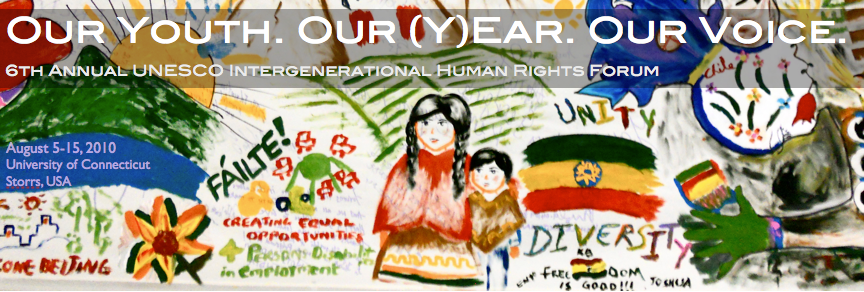In an afternoon full of reflection on theory and practice of human rights, we addressed the role of the UN in guaranteeing the universal respect of human rights and peace-keeping worldwide. Both in lecture and debate, we questioned the conflicting ideal and reality of human rights in our own communities and the world at large.
Keynote Address: Gillian Sorensen
In an engaging and motivating speech, Gillian shared her vast experience as assistant secretary-general for external relations of the UN on appointment by Secretary-General Kofi Annan.
After briefly summarizing the history of the Declaration of Human Rights and the structure and work of the UN around the world, Ms. Sorensen shared her reflections on the importance of humanizing the cold figures and statistics used to articulate populations discussed in human rights advocacy. It is critical in our work to remember that everyone around the world has faces and voices and are human beings.
She reminded us of always sharing our stories and listening to others, where questions like “Tell me your story, how did you get here?” can help to open conversations where dialogue and empathy develop and foster our understanding of the world and our shared humanity.
Gillian also reminded us of the fact that human rights abuses occur not only with death but trauma. Survivors of human rights abuse carry the burden of pain and memory throughout their lives, influencing others and the generations to follow.
Because human rights belong to each and everyone us, we need to work together in what it takes to assure their respect around the world. Ms. Sorensen especially insisted in that we need leadership to make it happen. After her experiences in conflict resolution and negotiations around the world, she confidently asserted that it takes courage and strength to demand human rights for all:
- to speak truth to power
- to face the risks involved in this type of work
- to call our own governments to account
- to do our research and effectively apply human rights to every aspect of our work and lives
 When finished, Gillian had to answered pointed questions regarding the work of the UN to assure peace-keeping in the world, prevention of war, and human rights abuses.
When finished, Gillian had to answered pointed questions regarding the work of the UN to assure peace-keeping in the world, prevention of war, and human rights abuses.Hasn’t the United Nations itself proved too bureaucratic to work?
Does the UN act upon the interest of certain member states?
Don´t you think the UN is run by double standards?
Do you have any suggestions or recommendations on how to remove the veto power from P-5?
Human Rights at large: Prof. Nasila Rembe
 In his lecture on the history and development of human rights, Professor Rembe defined human rights as a product of conflicts and struggles from around the world. They are steps toward a solution of realizing the values and aspirations intrinsic to human life. In the words of Boutros Boutros Ghali, the struggle for human rights is an attempt for citizens of the world to speak to one another in the “common language of humanity.” Professor Rembe reminded us that “human rights is a mirror that at once flatters us and shames us.” Inextricable from democracy, peace, and social justice, human rights cannot be fully realized without the existence of those three counterparts.
In his lecture on the history and development of human rights, Professor Rembe defined human rights as a product of conflicts and struggles from around the world. They are steps toward a solution of realizing the values and aspirations intrinsic to human life. In the words of Boutros Boutros Ghali, the struggle for human rights is an attempt for citizens of the world to speak to one another in the “common language of humanity.” Professor Rembe reminded us that “human rights is a mirror that at once flatters us and shames us.” Inextricable from democracy, peace, and social justice, human rights cannot be fully realized without the existence of those three counterparts.A group conversation on the universality of human rights followed, where many of us raised some questions. Some of them were:
Are the concepts of cultural relativism and universal human rights mutually exclusive?
Where is the universality of human rights when the policies of George Bush and Tony Blair are exempt from human rights law, but when developing countries execute similar policies, they are punished by the leaders of the international community?
After having dinner, we ended the day by splitting into smaller groups in facilitated group meetings. We were able to discuss our insights on the lectures shared today and get to know each other more.




No comments:
Post a Comment